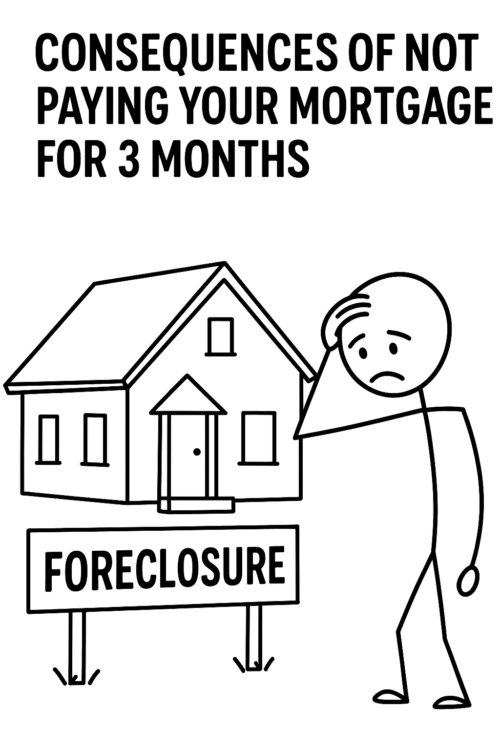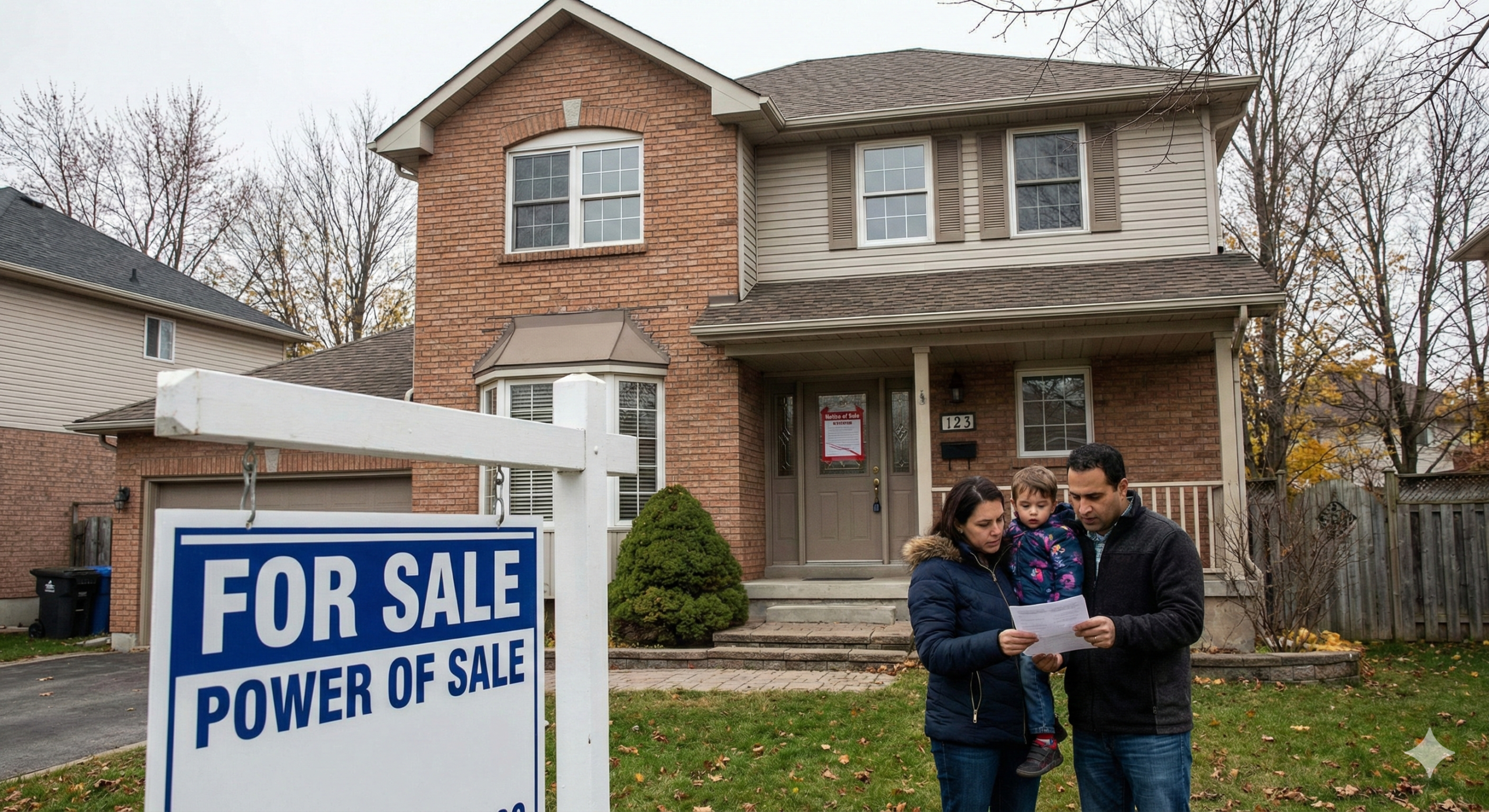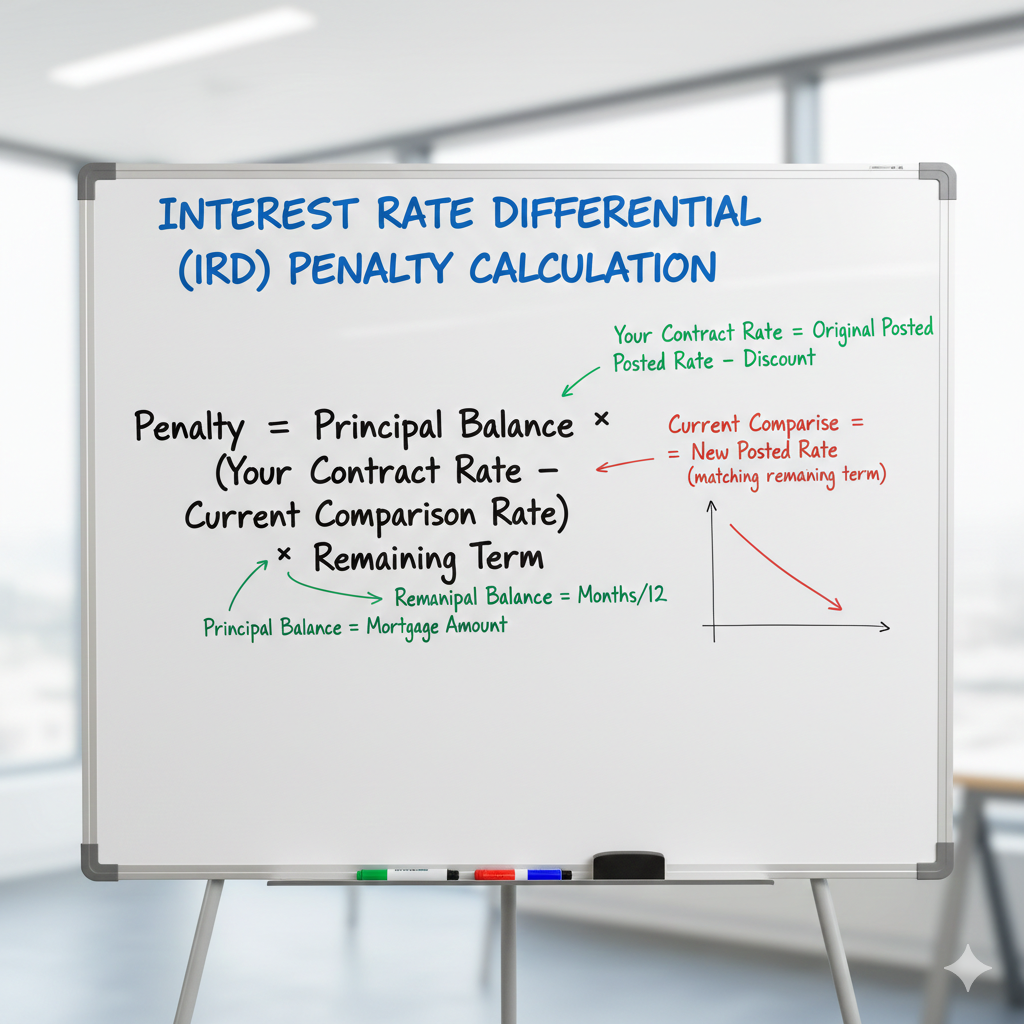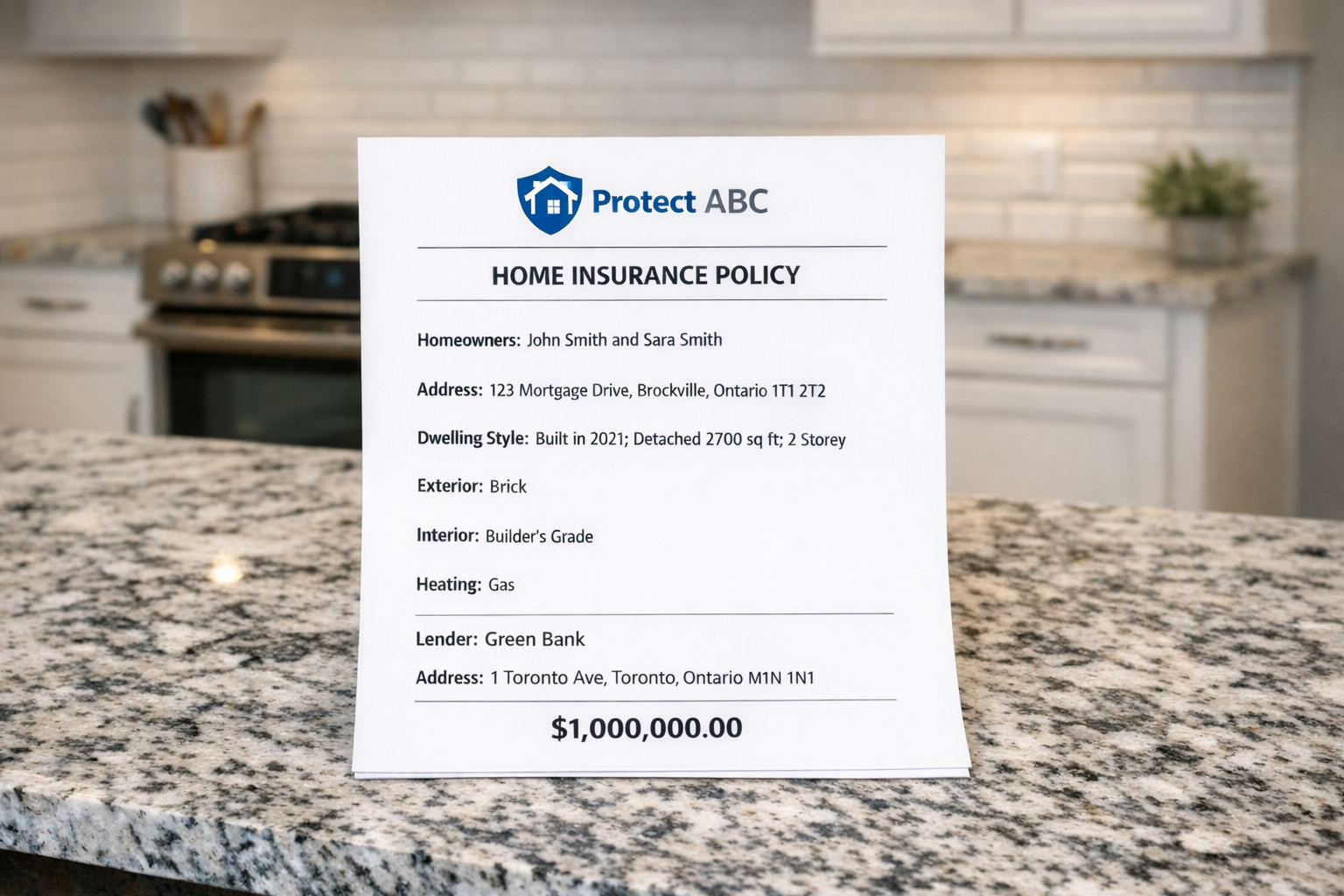Not Paying Your Mortgage for 3 Months
Missing a mortgage payment once is stressful. Missing three months in a row can feel terrifying. Collection calls start, letters arrive in the mail, and you may wonder: “Am I going to lose my home?”
If you’ve fallen 90 days behind on your mortgage (or you’re worried you might), understanding what actually happens next is the first step to taking back control. Lenders follow a process, and you have more options than you might think—especially if you act early.
In this guide, we’ll walk through:
-
What typically happens when you’re 30, 60, and 90+ days late
-
The real consequences of falling three months behind
-
How missed payments impact your credit and future borrowing
-
What lenders can do if the situation isn’t fixed
-
Practical steps you can take right now to avoid losing your home
Important: This blog is for general information only, not legal advice. Exact timelines and rules vary by lender and province. Always review your mortgage documents and speak with a professional about your specific situation.
Table of Contents
Toggle1. What Happens Month by Month When You Miss Mortgage Payments?
Most lenders follow a similar pattern when your mortgage goes unpaid. Here’s a typical timeline.
After 1 Missed Payment (Around 30 Days Late)
-
Late fee charged: Your lender usually adds a late fee if you don’t pay by the due date plus the grace period (often 10–15 days, but check your mortgage terms).
-
Collection calls and emails: You’ll start getting reminders—from friendly at first to more urgent over time.
-
Credit impact may start: If your payment is more than 30 days past due, your lender can report it to the credit bureaus, which can lower your credit score.
At this stage, most lenders still assume this is a temporary hiccup—maybe a missed paycheque or unexpected expense. If you contact them early, you may have options like short-term payment arrangements.
After 2 Missed Payments (Around 60 Days Late)
When you miss a second payment:
-
Account is considered “in arrears”: You’re now officially behind on your mortgage.
-
More aggressive communication: Expect more frequent calls, emails, and letters.
-
Credit score drops further: A second month of missed payments can deepen the damage to your credit.
-
Lender starts internal risk review: They’ll begin assessing how likely it is that you’ll catch up—or not.
Some lenders may already be warning you about potential legal action down the line if no arrangement is made.
After 3 Missed Payments (Around 90 Days Late)
At the 90-day mark (three months behind), things become more serious:
-
Your mortgage is seriously delinquent: Most lenders treat accounts 90+ days past due as high risk.
-
Pre-legal or legal notices may begin: You might start receiving formal demand letters outlining the total amount owed and the consequences if you don’t bring the account up to date.
-
Foreclosure or power of sale process may be triggered: Depending on the province and type of mortgage, your lender may begin the legal process to recover their money, which can eventually lead to the sale of your home.
The good news? Even at 3 months behind, it’s often not too late to work out a solution—but you must act quickly and proactively.
2. Critical Consequence #1: Rapid Damage to Your Credit Score
One of the biggest and fastest impacts of missed mortgage payments is on your credit score.
How Missed Payments Are Reported
Most lenders report to the credit bureaus in monthly cycles. When a payment is:
-
30 days late: Your mortgage may be reported as “30 days in arrears.”
-
60 days late: It may be reported as “60 days in arrears.”
-
90 days late or more: It’s often reported as “90+ days in arrears” or “delinquent.”
Each step down hurts your score more—especially if you had strong credit to begin with.
Why This Matters So Much
A damaged credit score affects:
-
Your ability to renew your mortgage at good rates
-
Your chances of getting a new mortgage with another lender
-
Approvals for loans, credit cards, car leases, or even some rental applications
Even if you catch up later, the record of those late payments can stay on your credit report for years, making borrowing more expensive and more difficult.
3. Critical Consequence #2: Growing Penalties, Interest, and Legal Costs
When you stop paying, the cost of being behind adds up quickly.
Accumulating Late Fees and Interest
Every month you miss:
-
The regular payment is still due
-
Late fees may be added
-
Interest continues to accrue on your outstanding principal
If your lender starts legal action, additional costs might be added:
-
Legal fees
-
Administration fees
-
Property inspection or appraisal fees (if required)
These costs are often added to what you owe, which means the longer you wait, the harder it becomes to catch up.
4. Critical Consequence #3: Increased Collection Pressure and Stress
Once you’re 90 days behind, you’ll likely experience:
-
Frequent collection calls at home or on your cell
-
Letters demanding payment and warning of the next steps
-
A strong sense of anxiety and stress every time the phone rings or the mail arrives
This emotional pressure is real, and it can make it tempting to ignore the situation. Unfortunately, avoiding calls and letters usually makes things worse.
Why You Shouldn’t Ignore Your Lender
It may feel uncomfortable, but:
-
Answering calls or calling back shows you’re engaged and willing to work on a solution.
-
Many lenders have hardship programs, temporary payment arrangements, or options to restructure your mortgage—but they’re rarely offered to borrowers who don’t communicate.
Being proactive can sometimes be the difference between saving your home and losing it.
5. Critical Consequence #4: Risk of Foreclosure or Power of Sale
If the arrears aren’t resolved, your lender can take legal steps to recover the money they lent you. Depending on the province and mortgage type, this may involve:
-
Power of sale (common in some provinces, particularly Ontario):
The lender can sell your home, use the sale proceeds to pay off what’s owed (including fees and costs), and then return any remaining equity to you. -
Foreclosure:
In a foreclosure, a lender asks the court to transfer ownership of your property to them. In some structures, you might lose your home and any remaining equity.
What Triggers These Processes?
Lenders usually don’t move to legal action after a single missed payment. However, when you’re:
-
90+ days behind and
-
Not responding or not making satisfactory arrangements
…they may decide they must act to protect their investment.
Can You Stop the Process Once It Starts?
Often, yes—if you move quickly. Depending on where you are in the process, you might:
-
Pay the arrears plus costs to reinstate your mortgage
-
Refinance with a new lender to clear the arrears
-
Sell the property on your own (before the lender does) to protect your equity
The key is timing. The earlier you seek help, the more options you have.
6. Critical Consequence #5: Loss of Equity You’ve Built in Your Home
Your home is likely your biggest asset. When you don’t pay your mortgage for three months and beyond, you’re not only risking your housing—you’re risking your equity.
How You Can Lose Equity
You lose equity when:
-
Legal fees and penalties are added to your mortgage balance
-
Forced sale of your home happens quickly, possibly below its full market value
-
You’re not in control of the sale’s timing or marketing
In a normal sale, a homeowner has time to:
-
List with a real estate agent
-
Market the home for the best possible price
-
Negotiate offers
In a distressed or forced sale, the priority is simply recovering the debt, not maximizing your return. This can mean thousands (or even tens of thousands) of dollars in lost equity.
7. Critical Consequence #6: Harder Renewals and Refinances in the Future
Even if you manage to catch up or resolve the arrears, the fact that you were 90 days behind can follow you.
At Renewal Time
When your mortgage term ends and it’s time to renew:
-
Your current lender will review your payment history.
-
If you’ve had significant arrears, they may offer less favourable rates.
-
In some cases, they may decline to renew, forcing you to find another lender under pressure.
When You Try to Refinance
If you’re hoping to:
-
Consolidate high-interest debt into your mortgage
-
Access equity for renovations or investments
-
Move to a better rate or different lender
…a history of missed mortgage payments can make approvals much harder. Some traditional lenders may say no, leaving you to consider alternative or private lending options, which often come with higher interest rates and fees.
8. Critical Consequence #7: The Emotional Toll on You and Your Family
Money troubles don’t just show up in your bank account—they show up in your sleep, relationships, and mental health.
Being three months behind on a mortgage can lead to:
-
Constant worry and fear about losing your home
-
Stress that spills into your family life
-
Strain on your marriage or partnership
-
Embarrassment or shame, which can stop you from reaching out for help
It’s important to remember: you are not the first person to fall behind on payments. Job loss, illness, divorce, and unexpected expenses happen. What matters most is how you respond now.
Practical Steps to Take If You’re 3 Months Behind on Your Mortgage
Knowing the consequences is one thing. Let’s talk about what you can do about it.
Step 1: Don’t Ignore Calls or Letters
As hard as it feels:
-
Open every letter from your lender.
-
Answer the phone or call them back.
Let them know:
-
Why you fell behind (job loss, reduced hours, illness, etc.)
-
What your current income situation looks like
-
That you’re committed to finding a solution
Lenders generally prefer to work with you rather than go through the cost and hassle of legal action.
Step 2: Review Your Budget Honestly
Take a clear look at:
-
Monthly net income
-
Essential expenses (housing, food, utilities, transportation)
-
Non-essential expenses that can be cut or reduced
Ask yourself:
-
How much can I realistically put toward catching up on my mortgage?
-
Is there room to restructure other debts (credit cards, lines of credit, car loans) to free up cash flow?
The more clearly you understand your numbers, the easier it is to present options to your lender or broker.
Step 3: Talk to a Mortgage Professional or Broker
A knowledgeable mortgage professional can:
-
Review your current mortgage and arrears
-
Look at your overall debt picture and credit
-
Explore options such as:
-
Refinancing your mortgage to pay off arrears and other debts
-
Moving you to a different lender (including alternative or private lenders)
-
Structuring a short-term solution to keep you in your home while you rebuild
-
Even if you think your situation is hopeless, there are often more options than you realize—especially if you still have equity.
Step 4: Consider Debt Consolidation Solutions
If other debts (credit cards, personal loans, lines of credit) are part of the problem, you may be able to:
-
Use your home equity to consolidate multiple debts into one payment
-
Reduce your overall monthly payments
-
Simplify your finances so your mortgage is easier to manage
This needs to be done carefully. You don’t want to trade short-term relief for long-term risk. A mortgage professional can help you compare the pros and cons.
Step 5: Explore All Options Before You Walk Away
If your income has dropped permanently or your home no longer fits your long-term plans, you may consider:
-
Selling the home yourself before legal action forces a sale
-
Downsizing to a more affordable property
-
Renting for a period while you rebuild your finances
While selling can be a painful decision, it’s often better than having your home sold under pressure, with extra fees and less control over the process.
How to Protect Yourself Before You Fall Behind
If you’re not behind yet but you see trouble coming, you’re in the strongest position to act.
Consider:
-
Contacting your lender early: Ask about temporary payment relief, interest-only periods, or other hardship arrangements.
-
Reviewing your mortgage at renewal: If your income or debts have changed, plan ahead so your new mortgage matches your reality.
-
Building an emergency fund: Even a small buffer can help you weather a short-term job loss or unexpected expense.
The earlier you act, the more options and leverage you have.
Frequently Asked Questions (FAQ)
1. Will I lose my home if I miss three mortgage payments?
Not automatically. Three missed payments is serious and may trigger legal processes, but there is often still time to work out a solution. Communication and quick action are crucial.
2. How long do missed mortgage payments stay on my credit report?
Late payments can stay on your credit report for several years. The exact time frame depends on the credit bureau, but in general, expect years, not months. However, their impact can lessen over time if you rebuild positive credit history.
3. Can my lender help me if I’ve lost my job?
Many lenders have hardship or relief programs for borrowers who face temporary setbacks. They may offer options like reduced payments, payment deferrals, or restructuring—but you usually have to ask and provide documentation.
4. Is refinancing an option if my credit is already damaged?
Possibly. You may not qualify with all traditional lenders, but alternative or private lenders may still be an option, especially if you have equity in your home. A mortgage broker can help you compare these options and understand the costs.
5. What if I can’t afford the home even after refinancing?
If the math simply doesn’t work—your income is too low or your debts too high—it might be time to consider selling and downsizing. While difficult, this can protect your equity and give you a fresh financial start.
Final Thoughts: You’re Not Alone—and You Do Have Options
Falling three months behind on your mortgage is scary, but it doesn’t have to be the end of your homeownership story.
To recap, if you don’t pay your mortgage for 3 months:
-
Your credit score drops and arrears build quickly.
-
You’ll face increasing pressure from your lender.
-
You’re at serious risk of legal action, forced sale, and loss of equity.
-
Future renewals and refinancing can become more difficult and more expensive.
-
The emotional toll can be heavy—but you don’t have to face it alone.
The most powerful move you can make is to take action now:
-
Answer your lender’s calls
-
Get clear on your budget
-
Reach out to a mortgage professional who understands late payments, arrears, and real-life financial setbacks
With the right guidance, many homeowners are able to save their homes, protect their equity, and rebuild their financial lives—even after falling behind.
- Can a Mortgage Company Evict You in Ontario? (2026 Power of Sale Guide) - February 23, 2026
- Crucial Ways to Survive the Redemption Period During Foreclosure: A Guide - February 21, 2026
- Painful Realities of the Interest Rate Differential Penalty You Must Know - February 15, 2026






